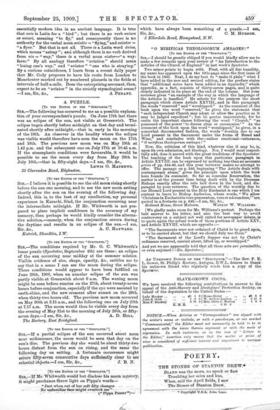" 0 MIRIFICAS THEOLOGORITM .A.MBAGES1
[To THE EDITOR OP THE "Bram:roan Sra,—I should be greatly obliged if you would kindly allow me to make a few remarks upon your review of " An In&oduction to the Articles of the Church of England" in last week's Spectator.
Two minor points to begin with. First, with all due humility, my name has appeared upon the title-page since the first issue of the book in 1895. Next, I do my best to " make it plain " what I have added in the new and revised edition, for the preface states that "additional notes have been added in an Appendix," which appendix, as a fact, consists of thirty-seven pages, und is quite dearly indicated in its place at the end of the volume. But your reviewer gives " an example of the way in which the language of the Articles is handled." He selects for the purpose the short paragraph which closes Article XXVIII., and in this paragraph the words "reserved" and "worshipped." As the comment of the book upon the word "reserved," he gives the statement that " each independent Church may adopt or allow the practice as it may be judged expedient"; but he quotes inaccurately, for he omits the important clause following the word " Church," "as possessed of the power 'to decree rites or ceremonies? " As the comment of the book upon the word " worshipped," he gives, in a somewhat disconnected fashion, the words "worship due to our Lord present in the Sacrament under the forms of Bread had Wine,' and concludes with the—rather emotional—utterance, " 0 mirificas theologorum ambages ! "
Now, Sir, criticism of this kind, whatever else it may be, is,, upon its own admission, not theology. Nor, I would most respect- fully add, does it accord with the great traditions of the Spectatent The teaching of the book upon this particular paragraph in Article XXVIII. can be expressed by nothing less than an accurate précis of pp. 344-46, and this your reviewer makes no attempt to offer. The passage on p. 346, beginning " The Article deals with contemporary abuse," gives the principle upon which the book here founds its comment. So far as concerns Reservation, the- matter is at the present time being dealt with by the Diocesan Bishops exactly after the rule laid down in the book, and dis- paraged by your reviewer. The question of the worship the to our Blessed Lord present in the Holy Eucharist is one which Inm content to leave to Bishop Andrewes, whose words, " Wei allow Christum in Encharistia were praesentem, yore et adorandum,' "are, quoted in a footnote on p. 346.—I am, Sir, &c., [We gladly make room for Mr. Williams's protest. Perhaps the best answer to his letter, and also the best way to avoid controversy on a subject not well suited for newspaper debate, is to quote again the actual words of those portions of Article XXV.. and Article XXVIII. Which are apposite :—
" The Sacraments were not ordained of Christ to be gazed upon, or to be carried about, but that we should duly use them.
"The Sacrament of the' Lord's Supper was not by Christ's ordinance reserved, carried about, lifted up, or worshipped."
And yet we are apparently told that all these sets are permiisible; or even enjoined I—En. Spectator.]










































 Previous page
Previous page